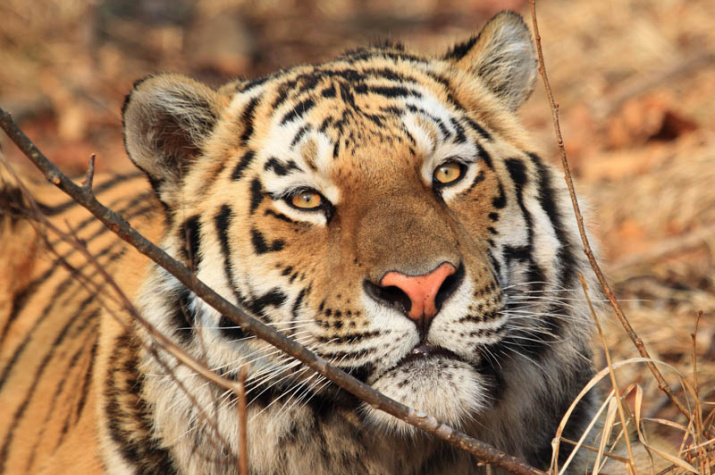Near the village of Yasenevy an adult male Amur tiger has been captured by employees of the Primorsky and Khabarovsky Hunting Inspection and of the Center "Amur tiger" in Primorye. The experts decided that the behavior of the animal was unusual and they sent it to the Khabarovsk rehabilitation center "Utyos" for further examination.
"The tiger for some reason is not afraid of people. It might be sick, but we do not see any symptoms of diseases. After we receive the results of the tests we will conduct a full examination,” commented Sergey Aramilev, the General Director of the Amur Tiger Center.
A group of tourists was the first to notice the tiger on the bank of the Bikin river. The tiger was lying on a rocky spit and did not react to people. Afraid to approach the animal, the tourists filmed it and gave the material to the employees of the Amur Tiger Center. Locals also saw the tiger. According to eyewitnesses, the predator lay on the bank and sometimes went deep into the forest. Arrived at the scene, the experts from the Hunting Inspection noticed that the tiger behaved unusually.
“It was found out that the predator had been seen at that place for several days. It was not aggressive, but didn’t avoid people. Such behavior is not typical for tigers. That is why we decided to take it to the rehabilitation center,” said head of the Wildlife Conservation Department of the Hunting Committee of the Natural Resources Ministry of the Khabarovsk Kray Yury Kolpak.
The captured tiger is an adult male. The preliminary examination of the predator showed that it had no visual damage. The experts do not exclude that a serious disease might be a reason for such untypical behavior of the wild cat.
"There are many natural foci of infectious and other diseases in the Far East, including neurotropic ones, which can change the behavior of animals and pose a danger to Amur tigers. The problem is not sufficiently studied and should be solved comprehensively. The research continues, the biological material received is very valuable, it will help to study natural foci of infections," explained Mikhail Shchelkanov, the head of the virology laboratory of the Federal Scientific Center for Biodiversity of the Far Eastern branch of the Russian Geographical Society.
The predator was taken to the rehabilitation center "Utyos" in the Khabarovsk Kray, where they made blood tests to find out the reason why the animal was acting untypically.

